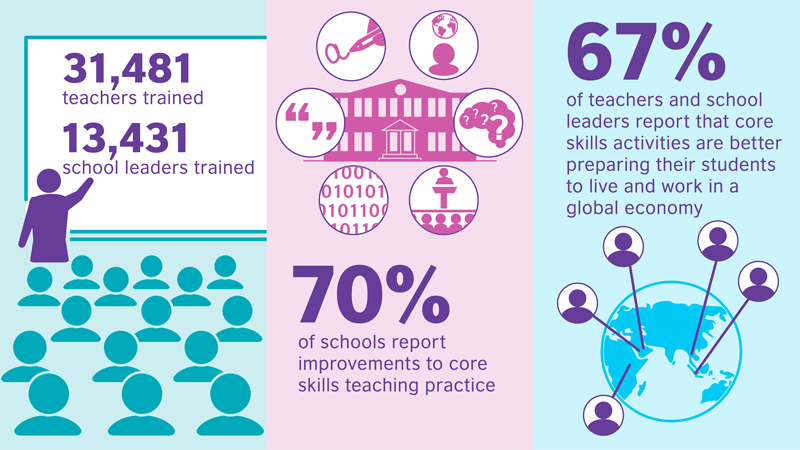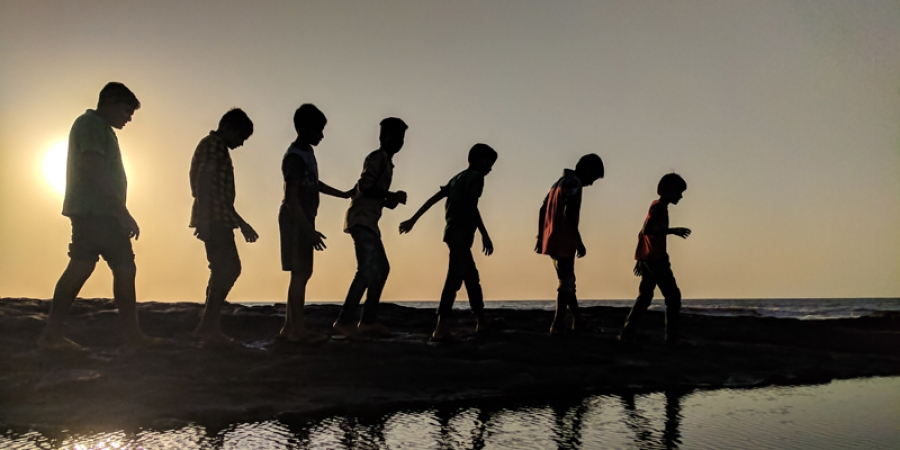International Friendship Day need not be reserved for a special time slot in the calendar. Internationalism - with all of its diversity, cultural richness and opportunities for vibrant community and world connections - is intrinsically linked to our everyday existence. It is the thread which creates potential for a dynamic tapestry of multi-disciplinary learning across schools and communities. It combines our own uniqueness with an interconnection of beautiful perspectives on what it is to be human in an outward looking, forward-thinking, inclusive world.
When we help our learners to become global citizens - to see themselves as players in a universal team that plays for the world, where everybody matters, where diversity is celebrated and where there is cultural respect and understanding - we open doors to real everyday international friendship. Here, we support the development of many important skills, including empathy, curiosity, courage, confidence, tolerance and creativity, skills which are key to unlocking and unleashing present and future potential for a peaceful, unified planet. In fact, these skills were manifest in abundance during the recent Thailand cave rescues, where a whole host of people came together from across the world with a common purpose; to share expertise in order to rescue the boys and their coach who were trapped. Hope and trust led to a very successful internationally cooperative operation in which any differences were irrelevant to the combined humanity of the group.
The following ideas are not exhaustive and are merely suggestions. They may well have occurred in your school already - if so, you can no doubt supplement them to support reflection and dialogue about your school’s internationality and interculturality. I am also making mention of UNESCO’s Rethinking Education: Towards a Global Common Good here, as it is a very insightful read and certainly gave me as a teacher, learner and citizen of the world much to think about.
We need not look far to unearth international gold in our schools and communities. There will always be young people, colleagues and families with direct or indirect connections to different countries, diverse nationalities, languages and invaluable cultural stories. By embracing these naturally occurring opportunities, learners can gain international perspectives in their own local contexts and see that their worlds are interconnected. They can also learn to celebrate and embrace diversity and differences.
- From clubs, assemblies, classroom research and local visits, to designing and sustaining cultural school gardens, sharing recipes from people in the local community, trying new foods, celebrating festivals, learning new languages and making school / community books in which cultural stories and poems are told and illustrated, there is a plethora of learning and sharing which can be facilitated across the curriculum.
- Business, community and college and university links are also excellent. Could you host a group of visiting international teachers doing a course, or develop your learners’ entrepreneurial skills by setting up social events, such as a culture cafe, for diverse members of your local community? Could you obtain support to construct a small cultural garden, or learn about international tourism and business through local hospitality links and business brunches, where there are opportunities for your learners to meet people who can talk about international links and their own journey in intercultural understanding?
- The British Council is a fantastic support for all things international, both for teachers and for learners. eTwinning, Connecting Classrooms, Erasmus+ and their very own International School Award are all wonderful for establishing and sustaining links, building international friendships, sharing projects and celebrating achievements. Their school and teacher resources platform is open to all teachers, and their classes and must not be perceived as the domain of the languages faculty or language teachers. There are opportunities in abundance for STEM, developing learners’ skills in literacy, numeracy, digital learning, creativity and competencies for life in an international world. There are dedicated British Council ambassadors who can come to your school to deliver professional learning and to help you to get started in your own context if you need support.

- Developing your own class blog is a productive way for learners to share international learning with the wider school, with parents and carers, and with the world beyond school. Similarly, following a blog of an ex-student who is taking a gap year to work with Project Trust, or who is studying or travelling abroad, is a wonderful way to forge direct, real and relevant links. Scotland’s National Centre for Languages has a good website with examples of ‘Language Linking, Global Thinking’ and ‘Business Link’ case studies.
WELL DONE ZINA FOR BEING ONE OF THE WINNERS OF THE MOTHER TONGUE OTHER TONGUE COMPETITION! #SCILT SCOTLAND'S NATIONAL CENTRE FOR LANGUAGES pic.twitter.com/qrYF2RGUcK
— St James' Primary (@StJamesPSR) March 29, 2018
- You could establish your own international school ambassadors or language & culture mentors to work with younger learners or community groups. This helps support the development of leadership skills and confidence, allows for positive peer interaction and role-modelling, and may create opportunities for your learners to achieve wider achievement awards. Either way, you can set up your own working group, as well as providing school certificates and awards.
- Language assistants are an excellent means of bringing real-life international learning into school. They can provide cultural experiences, games and linguistic support in classrooms, small groups and clubs. Assistants can be shared between schools locally. There may also be a possibility of tapping into the community if assistants are not possible. Is there a parent who would like to volunteer with the school to enhance international learning?
- The Sustainable Development Goals are high on the international agenda, and can be incorporated across the curriculum in different ways and at different levels. Not only does this unite learners and teachers in a common international endeavour; it also provides many enriching and valuable learning experiences in school, for both outdoor learning and for community / international links and projects.
- Finally, Twitter is an excellent tool for international learning. @UNICEF, @UNESCO, @voicesofyouth and @TeachSDGs (to name but a few accounts) provide interesting ideas and very real insights into the lives of people around the world. There are many more!
Thanks to @kkidsinvt and @JenWilliamsEdu for pushing me to dive back into school stuff with the #MicrosoftEdu Teaching Sustainable Development Goals course! #CelebrateMonday #TeachSDGs https://t.co/hcYx5xmWYQ via @MicrosoftEDU
— Sara Holm (@SaraHolm15) August 6, 2018
While historically or traditionally, international education was perhaps more associated with cultural study trips abroad, exchanges, or with the languages department, today’s international is not abroad or confined to one particular curricular area. International is here, and there, and you, and me, and them. Our world is composed of a series of international experiences we may not recognise at first. They are in our food, where it comes from and how it arrives, they are in our shops, our art, our music, our words, our films, our books and our everyday exchanges and our friends. We are all international, but to develop an international mindset and outlook in our learners, we as teachers can contribute in our own contexts every day and everywhere. We can help our society towards a more equitable, tolerant, kind and accepting world by actively supporting our learners to develop into and to see themselves as dedicated global citizens.
Want to receive cutting-edge insights from leading educators each week? Sign up to our Community Update and be part of the action!


















